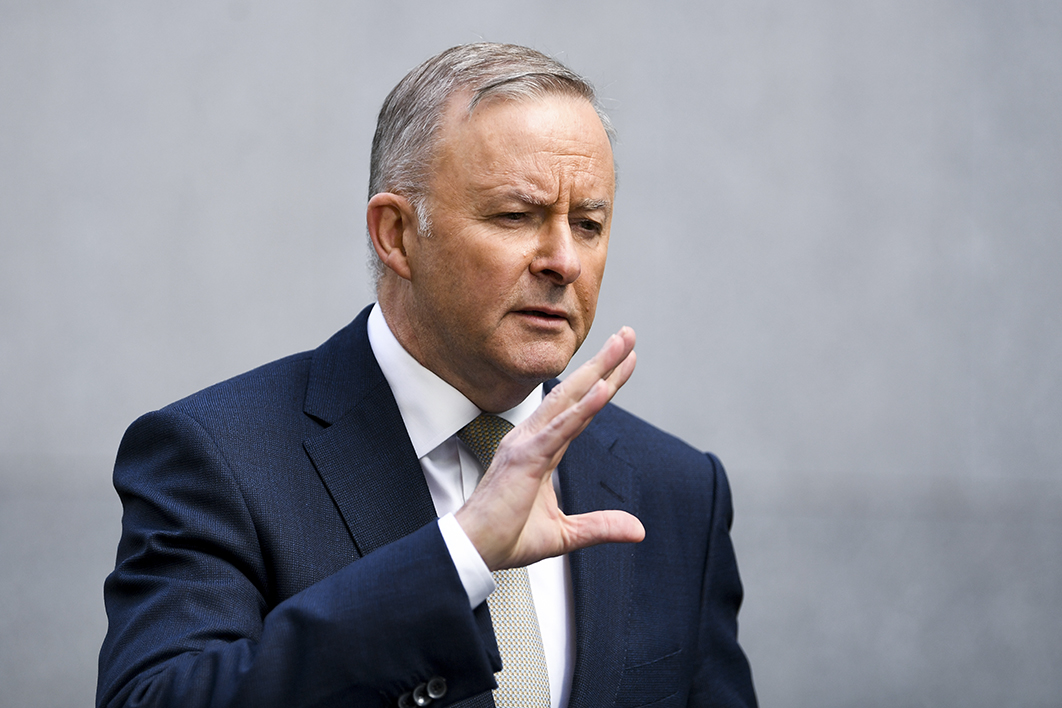Anthony Albanese has spent the last few weeks trying to neutralise issues the Coalition could turn into fear campaigns at the next election. It is a predictable move, but is it enough?
During the 2019 campaign, the Coalition successfully branded Labor’s franked dividend proposals a “retiree tax” and its negative gearing and capital gains tax proposals a “housing tax.” Labor was even accused of supporting a “death tax.” Leader Bill Shorten’s big-spending plans were badged as “the Bill Australia can’t afford,” and the party was also accused of betraying blue-collar workers in regional mining communities by supporting a Greens agenda.
As a result, Labor has abandoned its negative gearing and capital gains tax policies, having disavowed its franked dividend plan earlier this year. Now it has announced its support for Coalition tax cuts that will benefit higher-income earners, including men over women, and Albanese has assured coalminers of Labor’s support for their jobs and employment rights.
Of course, abandoning taxes and supporting tax cuts means losing the revenue that helps fund government programs. Albanese has tried to neutralise domestic opposition by arguing that additional revenue will be generated by “making sure” multinationals pay their share of tax, though the practicalities of doing that haven’t been made clear.
These reversals have led to disquiet within the party. But Albanese’s rationale, in Michelle Grattan’s words, is that “whatever policies Labor has, they are useless unless it can win power.” Grattan cites Gough Whitlam’s pragmatic argument against the Victorian Labor left of his day: “the impotent are pure,” he declared, but only electable parties can implement policies. It may be no coincidence that Albanese tweeted “We miss you” on the recent 105th anniversary of Whitlam’s birth.
Whitlam was no stranger to fear campaigns. During their long years in opposition, he and his colleagues fell victim to Coalition-fuelled fear campaigns, including the fear of socialism and communism that had been used to defeat the Labor government of Ben Chifley in 1949.
Whitlam also wrote about how the fear of China played a major role in Australian politics. Fifty years on, during the 2019 election, the Coalition charged Labor with being soft on China. Albanese has acted to neutralise such accusations by endorsing US foreign policy approaches under Joe Biden and critiquing China on human rights and the South China Sea, while also arguing for improved Australia–China relations.
Whitlam argued that the role of government should be “to reduce fear, not raise it,” signalling that his party, if elected, would deal with the fear of unemployment, the fear of poverty in old age, the fear of being unable to afford necessary health treatment, and the fear of educational disadvantage for one’s children. In other words, Whitlam pledged, like most social democratic leaders, to make citizens feel secure and protected.
Albanese has been doing his best to hose down potential fear campaigns against Labor. But has he done enough to encourage those positive emotions, to make voters feel that a Labor government will look after them?
Labor has certainly exploited Scott Morrison’s “protective masculinity” fail on Covid by suggesting it would do a better job of managing the pandemic and keeping Australians safe. Labor’s message that Morrison has failed in his two main tasks — quarantine and the vaccine rollout — appears to be cutting through and is reflected in the polls, where it is currently ahead 53–47 on a two-party-preferred basis.
Labor hopes that the blokey image of “Albo” will help to counter the equally blokey one of “ScoMo,” including among male blue-collar voters. It has made a major effort to humanise “Albo” by reminding us how he was raised by a single mother in council housing and arguing that his background drives his commitment to social justice for ordinary Australians.
Albanese pledges to tackle traditional social democratic issues such as infrastructure and education, and ensuring better-paid and more secure employment. He emphasises that “Labor will always fight to protect your job and your rights at work.” Partly to counter business-funded fear campaigns, though, he has also pledged to consult with industry to create the conditions for full and secure employment. As I argued earlier this year, that cooperation may turn out to be more difficult than Albanese suggests, given that Labor wishes to increase wages and improve working conditions.
Despite his efforts, Albanese’s latest Newspoll satisfaction rating was five points lower than in March, and he still trails Morrison as better prime minister 36–49. Australians may be hearing Labor’s critique of the Morrison government’s pandemic performance, but are the positive messages about Anthony Albanese, and what he represents, cutting through?
Neutralising Coalition fear campaigns against Labor is not sufficient. If Labor wants to increase its chances of winning the next election, it needs to make voters feel that it is Labor, rather than the Coalition, that will protect them and create a better future. As Whitlam was aware, that means government action to reduce everyday fears regarding incomes, jobs, health, welfare and equal opportunities. Anthony Albanese needs to be seen as the leader who can deliver that; otherwise, Labor may face yet another “miracle” win by the Coalition. •




